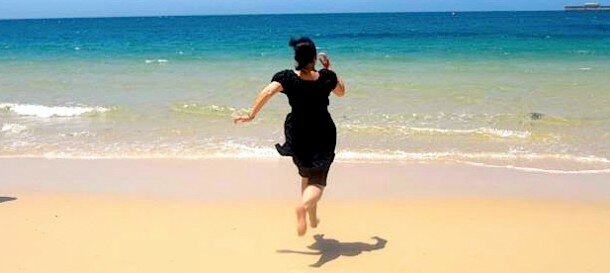Retirement Lite – Think differently about retirement

August 6, 2013 Blog Rebecca River Forbes
Go on, retire … but just for a bit. Instead of working for years and waiting for one big retirement at the end of life, why not take a chunk of your retirement every few years. Go off and have adventures, enjoy the freedom of retirement, do whatever you’ve always wanted to do, but you’ve never had the time. Then come back, and bring with you your experiences, your ideas and all the things you learnt in your time off.
Abandoning the macro-retirement in favour of a series of micro-retirements
There’s a quiet revolution happening, people are starting to think differently, in a brilliantly selfish and liberating way, about retirement. Instead of working until you’re in your mid to late 60s before you retire wholesale; how about breaking retirement up into smaller chunks and spreading it throughout your life like having a grown-up gap year every few years.
This idea has been around for a long time in academia; sabbaticals are traditionally a year of leave every seven years, but why are sabbaticals reserved for academics? It’s entirely plausible that someone who doesn’t work in a University might enjoy time off and possibly be in danger of having good ideas while they’re at it.
My micro-retirement
Last year, aged 32, I retired. I’m not a millionaire, I’ll explain later how I funded it; and I’m not lying about my age either – although that has been known to happen. I spent the year travelling around Italy, working as a volunteer in South Africa then travelling and camping through Botswana, Namibia, Zambia and Johannesburg, trying to provoke an incident that would leave me with a cool scar and a death-defying traveller’s tale. I suffered no such near fatal injury but I had a great time trying.
I didn’t like the idea of waiting till I’m (does a quick calculation on the state pension website…) 68 to go and enjoy myself. How much fun is that really going to be? I’ll be old, if not dead – my friends will, no doubt, be in less than tip-top condition considering how much we drink, smoke and avoid exercise like it’s the next outbreak that will kill us all, rattling around talking about hip replacements and denture care … oh and in all likelihood, I’ll be poor, I fully expect my itty bitty pension to just about cover the central heating bills if I want to get warm, rather than the preferred option of trekking around Africa with a tent, a sleeping bag and a torch to wave around to scare the jackals, hyenas and whatever else is lurking in the bush, which also doubles as a bathroom. I really hope I am still doing that when I’m 70, but if I put aside the statistical improbability that I’ll have plenty of money and be in great shape; to be frank, I’m not very good at waiting for things.
I decided that every few years I should take a few months to a year off, to retire for a bit; to do exciting (read stupid and dangerous) things. Since I have no insider information on when and how I’m going to die, I reasoned that I’d better get a move on with my bucket list. Being intrinsically lazy, working full-time while ticking off my bucket list does not appeal. It seemed like a lot of long days where I’d not be seeing enough of my bed so I thought I should actually take a year of retirement and do it properly. In the words of Yoda (before he got a job at Vodafone) ‘Do… or do not. There is no try.’

San bushmen in Botswana
Famous advocates of the micro-retirement
It turns out that I did not invent this concept, many people smarter than me have talked and written a lot on the subject. Tim Ferriss, author of The 4-Hour Work Week talks about the micro-retirement; breaking retirement up into a series of micro-retirements rather than a single macro retirement, which in a nutshell, is exactly what I decided to do. Stefan Sagmeister, in his TEDGlobal 2009 talk, ‘The power of time off,’ takes one year of retirement for every 7 years of working. Sagmeister is a man to listen to when it comes to working hard and creatively while not burning out; he’s a Grammy Award-winning graphic designer, who runs his studio Sagmeister & Walsh Inc, in NYC;
‘We spend about the first 25 years of our lives learning, then there is another 40 years that’s really reserved for working. And then tacked on at the end of it are about 15 years for retirement. And I thought it might be helpful to basically cut off five of those retirement years and intersperse them in between those working years.’
He attributes many of his successes in his working life to ideas that come from his retirement year. The year of retirement gives him peace, energy and vitality that feeds back to his life and work.
I liken it to leaving a field fallow, rather than leaching it dry of nutrients and getting progressively poorer and poorer yields, leave it empty now and then and give it time to regenerate. Sagmeister, in his TED talk, cites plenty of examples of people who’ve taken a break then come back with fresh and exciting new ideas and happily, it’s catching on. Google have famously gives employees up to 20% of their time to work on personal projects unrelated to their jobs. Google claim that many of their Google Labs projects have come from this creative head space. Take away the pressure and monotony of a job and that’s when creativity breeds and interesting things start to happen. In my retirement year I didn’t do anything revolutionary, but I did write a good chunk of a novel, found life-long friendships, had unforgettable experiences and learnt a lot. If I had the choice to do it again – I wouldn’t swap my year of retirement for a year’s wages, or even two years’, or even many dearly missed cups of proper Yorkshire tea … with biscuits.
Funding a mini-retirement
Traditional academic sabbaticals are, of course, paid leave. If you’re going to up-sticks and take a mini retirement then best of luck to you if you’re trying to get paid for doing it. Whilst I realise that to be able to take a lot of time off and having the resources to act out dubious impulses puts me in a very privileged position, I must take a minute to explain, mainly because of the working class chip (more like a cliff face) on my shoulder, that I didn’t do it by dipping into the bank of Mum & Dad, winning the lottery or robbing a bank. I did it through my love of, and ruthless dedication to minimalism. Having awareness as to what I need and what value I attach to things has given me so much financial freedom.
John Gerzema, in his TEDx KC talk ‘The Post-Crisis Consumer’ talks about the move from mindless spending to mindful consumerism. That less excess brings physical freedom and financial freedom. Hurrah to that, I say. As a snippet of how I do it; I try not to tie myself into contracts that will slowly milk my bank account, and tether me to the same geographical space, like a 12 month gym membership or broadband contract. I try to be mindful of purchasing things that I probably won’t get much use of or that I can’t be bothered carrying around every time I rent a new apartment. I remind myself that it’s not just how much an item will cost financially, it’s also about how much space it will take up when I move (and I frequently do, for work) so every item really has to earn its keep. I also have a one-in-one-out policy, so if I want to buy a new book, and I have a serious problem when it comes to second-hand books, I must finish one and give it away before I allow myself another one. I’ve been a reader of Leo Babuta’s Zen Habits blog on minimalism for years and should I feel myself getting too comfortable in my surroundings and my belongings start to multiply to fill every last nook and cranny, then a good dose of Zen Habits brings me back from the edge.
Last year before my big adventure, I rented out my house, furniture included and only kept the things that were important and could fit into one car load. Spending hours listing items on eBay was beyond dull, but very liberating watching the pile of belongings dwindle down to nothing. I put my stuff in storage (the cheap storage solution being my Mum’s attic), sold my car and headed off into the sunset. Since I didn’t find a tree that grows money (damn) I’ve come back to England to be gainfully employed and restock the sad and empty bank account. That’s okay though, give me another few years and I’ll throw a dice, spin a globe or have a silly idea that I can’t and won’t shake off.
Related Posts
Rebecca River Forbes
For economy tokens I'm a UX consultant. The rest of the time I'm a writer (stories, blogs and a novel), bendy slinky yoga-ist, feminist, devourer of books, comfortable minimalist, raider of lost charity shops, creator of vegan food things, and travelling hobo.


 How to Find Adventure on Your Doorstep?
How to Find Adventure on Your Doorstep?
 Kenyan Adventure
Kenyan Adventure

One Comment to “Retirement Lite – Think differently about retirement”